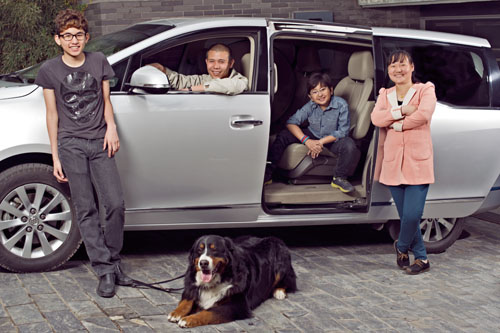
The relatively low cost of domestic help in China is one of the luxuries of expat life. A boon for busy families, the occasional cleaning services can even be afforded by many young foreigners living here. Domestic helpers (commonly addressed here as ayi), whether used for daily household functions such as cooking and cleaning, driving, or assistance with child rearing, not only make life easier and more comfortable, but with proper management these employees can become helpful allies in cutting through red tape, finding good produce, and paving the way in a foreign environment.
While drivers may be assigned to executives by their company, domestic helpers will almost always be hired by the family either directly or via a service. That means an interview process likely conducted through an interpreter. However, don’t be fazed by this. Evaluate the candidate the same way you would at home, and use the same criteria and common sense principles.
Start by checking the applicant’s references and don’t hesitate to contact previous employers. Each family will have its own requirements; an understanding of their expectations will help frame the interview and their own recommendation.
Ask as many questions as you feel are necessary. This person will have a significant place in your family’s life going forward, and can be a big plus or a big minus, so this is the time to find out what you want to know and clear up any issues that may arise. Communicate your expectations clearly and emphasize what’s most important.
It’s also a good opportunity to see how much English the applicant speaks, if any. In the end, use your judgment. Consider asking the prospective ayi to go through some kind of trial, such as preparing a meal or doing some cleaning, although it is customary to pay her a day rate in this case.
Finding an Ayi
June or December are the best months to find full-time help, as those are prime relocation times and many contracts will end then. Recommendations from outgoing families in your work community are a great place to start, and helpers may feel more comfortable staying on with employees from the same company.
If there are no such leads, look in the classified ads sections of websites including beijing-kids.com and theBeijinger.com, and Yahoo! Groups such as Beijing Mamas. Many ayis will post employment ads at local stores; just bear in mind that an ad in English doesn’t necessarily mean that the ayi herself wrote it. Customer service departments of housing compounds occasionally keep portfolios of former residents’ employees and may be able to help with translation during an interview.
A professional hiring agency can potentially simplify this process, but this path will require an evaluation of agents. Again, one’s company may recommend an agency vetted in advance. Bear in mind that going through an agency likely increases the cost of the hiring and perhaps monthly rates as well, although it may make it easier to change ayis if the first one isn’t satisfactory. It’s also important to clarify how the fees are split between the agency and the ayi to ensure fair treatment and avoid any misunderstandings.
There are agency services that can provide ayis, drivers, Mandarin classes, and more, with frequent discounts for multiple needs. This route can take some of the guesswork out of the process, with background checks, health checks, and training offered.
Agencies generally require clients to pay a membership or management fee for some of these extra assurances, but the monthly pay then goes directly to the ayi for the work she does. Wary expats may be concerned that some of the ayi ’s full pay goes to a third party, but both Beijing Ayi Housekeeping Service Company and Beijing EX-PATS Service assure customers that ayis get paid as contracted. Agency websites are a great resource for pay ranges clearly outlined according to qualifications, language ability, hours and more. Childcare helpers are usually hired through agencies, although direct hiring is also possible.
To address the potential problem of agencies taking advantage of ayi pay, Beijing Municipal Labor and Social Security Bureau issued standard wage rates and tied them to levels of service. Most agencies abide by this code and will refer ayis with different salaries based on their skill and experience levels. Problems do remain, however, considering the numbers of domestic helpers in Beijing and the high demand from families.
Along with establishing expectations for routine tasks, it’s also important to discuss holiday periods in advance. How much time will the ayi have off for Chinese New Year, and will she receive a guaranteed bonus (often referred to as a 13-month bonus)? Many ayis will expect this. Will they receive non-holiday paid vacation time? Will you expect her to travel with you, including out of the country?
When new families come to Beijing, a lot of energy is spent on discussing the ayi situation here. Are ayis too demanding? Is inflation greatly affecting local residents? Arm yourself with the information you need and make the right decision for your family accordingly. If you’re happy and your ayi is happy, that’s all that really matters. What’s important is making a decision based on what you’re comfortable with. It may take a try or two to get it right, but putting in the effort to find and train your ayi will yield positive results for all concerned.
Questions to consider when hiring an ayi:
- Does the ayi speak English? If so, how well?
- Has she worked with foreign families before? If so, are their customs and background similar to yours?
- Is she certified in CPR and first aid?
- How old were the children she has cared for in the past? How much experience does she have caring for babies?
- Is she available for babysitting and/or on weekends?
- Does she have any experience looking after pets? Does she have any allergies?
- Do you need her to cook? Do you want her to cook western food?
- Do you want a live-in ayi? If so, what living requirements does the applicant have and can you accommodate her needs?
- Do you want a trial period? This is normally a minimum of three weeks and a maximum of three months.
- Is she trustworthy? Was she referred to you by a friend? If not, can you keep a copy of her Chinese ID card?
- What exactly do you want your ayi to do? Be specific about the daily responsibilities required, as well as a list of additional tasks such looking after the children at birthday parties.
- If you have pets, is she afraid of or allergic to them?
Discuss all aspects of money and time, including pay, overtime, raises, bonuses, holiday leave, and sick leave. If you are interested in a particular posting or referral from an acquaintance, contact the ayi immediately. Good ayis are always in demand. Remember that ayis have different strengths and life experiences; don’t assume they can read your mind about what you want done or how. Expect to spend a fair bit of time showing the ayi what “clean” means. It’s best to demonstrate at the beginning how you would like things like laundry, folding, and storage to be done so there is no confusion.
Questions to consider when hiring a driver:
Drivers usually own their own cars, so first consider the type of vehicle (sedan, minivan) and what it will be used for (daily commutes and/or weekend outings), then the drivers themselves. Buying cars in Beijing is now highly restricted, so often a car and driver are your only choice for personal transportation. Drivers can be hired directly or through a car rental company, as the latter has certain certifications and requirements for the people they employ. Car rental companies also have a pool of vehicles to choose from. Use the same criteria and process as choosing an ayi.
Car rental companies charge RMB 4,000-5,000 per month for an English-speaking driver. This does not include gas or tolls. Standard hours for drivers are 7am-6pm from Monday to Saturday. If you need a driver outside those times, expect to pay overtime – around RMB 10 per hour during the week, RMB 20 per hour on Sundays, and RMB 30 per hour on holidays. Be flexible; if you plan on using him as the designated driver for night outings, you may want to give him the next day off. Here are some factors to consider:
- Do you need the driver to speak English?
- Does he have experience with expat families?
- Has he ever been involved in an accident?
- What kind of car does he drive?
- How much will his salary be? Will there be overtime pay?
- How much will the annual bonus be?
- What will be the standard working hours?
Chinese Glossary
Here’s a glossary of the various terms and functions applied to the people who make life easier:
Ayi 阿姨
In Chinese society, this is the way that an older, unfamiliar woman would be addressed – especially by children – but in this case refers to a female domestic helper. It specifically applies to domestic helpers (both live-in and part-time) who help with cleaning and housework.
Yuesao 月嫂
Yuesao specialize in caring for mothers and newborns, typically doing everything from cooking and cleaning to feeding and even serving as a lactation consultant. Most are contracted through agencies and demand premium prices due to the specialized nature of their work, which they make a point of distinguishing from everyday housework – so don’t expect them to iron dad’s shirts. The going rate in the CBD is currently RMB 6,000 and over per month.
You’er Sao 幼儿扫
Most directly translated as “nannies,” you’er sao are typically hired through agencies to care for younger children. They can also do housework, cooking and chores. Their monthly salaries are a little lower than those of yuesao, typically ranging between RMB 4,000 and 8,000 in the CBD.
Jishi 技师
Typically addressed as shifu (“master”), jishi are the skilled workers you call when your toilet clogs up or your air conditioner stops working. They vary in quality from very helpful to entirely useless. Sometimes, an ayi‘s husband or relative will do a better job for a better price.
Wuye 物业
The building management or wuye is responsible for managing your residential compound or neighborhood, including the upkeep of the buildings, grounds, and facilities – a service for which it charges an annual fee to residents. Many wuye can refer domestic help agencies and repairmen. Although many are quite professional, bear in mind that property management companies don’t make money from extensive repairs, so they may use a bit more spit and glue than would seem appropriate at times.
Xiaoshigong 小时工
Refers to cleaners paid by the hour who usually work for an agency or wuye. Hourly wages vary from area to area; in the CBD, the going rate has increased to around RMB 30 an hour. In addition, xiaoshigong typically charge more for specialized tasks such as floor waxing. For smaller apartments and single white-collar workers, xiaoshigong may be a better choice than employing a regular ayi.
This article originally appeared in the beijingkids Home & Relocation Guide 2014. To get your free copy, email distribution@truerun.com or view it online at Issuu.




1 Comment
Hi I am Lucy ,a chinese ayi ,I have worked ten years in foreigner family where from American,French and British,I can do going shopping ,taking care of kids,washing and ironing,cleaning ,walking dog and looking after cat,cooking chinese food and simple western food,You can add my wechat chene18910576970 if you are interested ,thanks